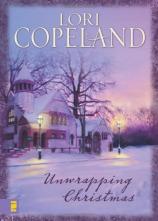Unwrapping Christmas
Review
Unwrapping Christmas
In UNWRAPPING CHRISTMAS, prolific novelist Lori Copeland spins a slim faith-filled story of an overloaded mom and the true meaning of the holiday.
Copeland’s protagonist, Rose, is a 38-year-old mother with teens who doesn’t know how to say no. “I guess I could” is her ever-present mantra when asked to do anything at church, at home, or for her Minnesota community. The tension of feeling that she needs to do “the Lord’s work” is running her life. If anyone needs a casserole, a volunteer shift, a voice in the choir, or a shoulder to cry on, Rose is there to meet their needs. Anyone’s needs, that is, but her own family’s.
She knows Christmas “should be more than frantic activities, hectic crowds, and overworked husbands… it wasn’t that she didn’t want to slow down, but life got in the way… she was do busy doing Christmas, there wasn’t time to experience Christmas.”
As the story progresses, Rose’s husband accuses her of neglecting her family. But, muses Rose, trouble had never touched them yet. After Christmas she promises herself that she’ll get things back in order. After Christmas they’ll eat dinner together, she’ll have time to really talk with her kids, and she and Joey will get their marriage back to where it used to be. After Christmas….
But she finds herself praying, “Dear God, why do I feel so worn, so empty, so tired? I spend every waking moment doing what I can, but my efforts amount to sifted chaff, they’re meaningless….” Shouldn’t all her busy-ness be making her feel good? Over-committed readers will resonate.
As Rose continues to say “yes,” you’ll see what’s coming. Of course, things fall apart before Christmas, and Rose is forced to come face to face with the consequences of her busy-ness. Anna is involved with a boy who is three years older and, from all appearances, not the sort of date Rose envisions for her daughter. Son Eric feels neglected and gets into trouble at school. Husband Joey works later and more often. The climax, when it comes, shows Rose that she doesn’t have to run the world alone --- and that others can rise to the occasion when called on for help.
Even though all of her hustle and bustle is to do good deeds, or do things for God, Rose finally realizes that she has neglected the most crucial to-do list of all --- making time for what is most important. Or, as her husband tells her when she finally hits the wall and can’t do another thing: “Let someone else experience the blessing of helping out. You’re hogging it all.”
Copeland sermonizes a little, especially when Joey lectures Rose about her do-good habits after an accident, and the story loses steam in the last quarter. The formatting is uneven throughout the book, which I found odd; some chapters begin with a beautiful screened art candle and trivia about Christmas, others do not. The end of the novel is padded with recipes, a letter from another author on the life of Christ and a sample chapter from an upcoming Copeland book.
If you are looking for a priority check for the Christmas season, or if you are the type of woman who gets over-committed during the holidays, you may find this story a timely reminder of what is most important. And there’s no time like the Christmas season to reassess priorities and commit to New Year’s resolutions about saying “no” to good things sometimes, when they keep us from caring for those we love.
Reviewed by Cindy Crosby on September 18, 2007





